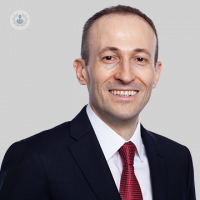What happens when you have PCOS?
Escrito por:The symptoms of polycystic ovary syndrome (PCOS) are wide ranging and can lead to a lower quality of life. In order to provide further detail about them, and the condition as a whole - including signs and management, Mr Pandelis Athanasias, a highly-esteemed consultant obstetrician and gynaecologist based in London has put together an informative article.

What is Polycystic Ovary Syndrome (PCOS)?
Polycystic ovary syndrome (PCOS) is a common condition that affects around 10 per cent of women. It interferes with the way in which a woman’s ovaries function. When a woman has PCOS, her ovaries will contain a large number of small harmless follicles (fluid-filled sacs) that are up to 8mm in size. These follicles are often unable to release an egg, so this means that normal ovulation, or release of egg, cannot occur.
What are the initial signs of PCOS?
PCOS usually presents itself during adolescence and results in hormonal imbalance. Several problems can be caused, such as:
- Irregular periods;
- Weight gain;
- Excess body and facial hair, and;
- Difficulty in getting pregnant.
How does is the body affected by PCOS?
PCOS symptoms differ from woman to woman, with some only experiencing very mild symptoms and others suffering from the full range of PCOS symptoms.
Common symptoms of PCOS include:
- Mood swings and depression;
- Hair loss (alopecia) and thinning hair;
- Difficulty in getting pregnant;
- Periods that are irregular or absent;
- Difficulty in losing weight, and weight gain;
- Excessive hair growth on the face and body;
- Acne and oily skin.
What age groups are commonly affected by PCOS?
PCOS can be diagnosed at any stage after puberty; however, most women find out they have PCOS in their 20s and 30s.
How does PCOS affect the ability to become pregnant?
PCOS interferes with the growth and release of eggs from the ovaries (ovulation).
How can PCOS be managed?
Whilst there is currently no cure for PCOS, there are several PCOS treatment options aimed at managing and reducing the symptoms. The options available can be discussed in our clinic and are typically tailored to each individual woman.
A combination of:
- lifestyle changes;
- nutrition tips, and
- supplements/vitamins and medications;
are all recommended to deal with the current symptoms of PCOS and reduce the long-term risks associated with the condition.
If you’re looking for expert PCOS treatment, arrange a consultation with Mr Athanasias via his Top Doctors profile.


